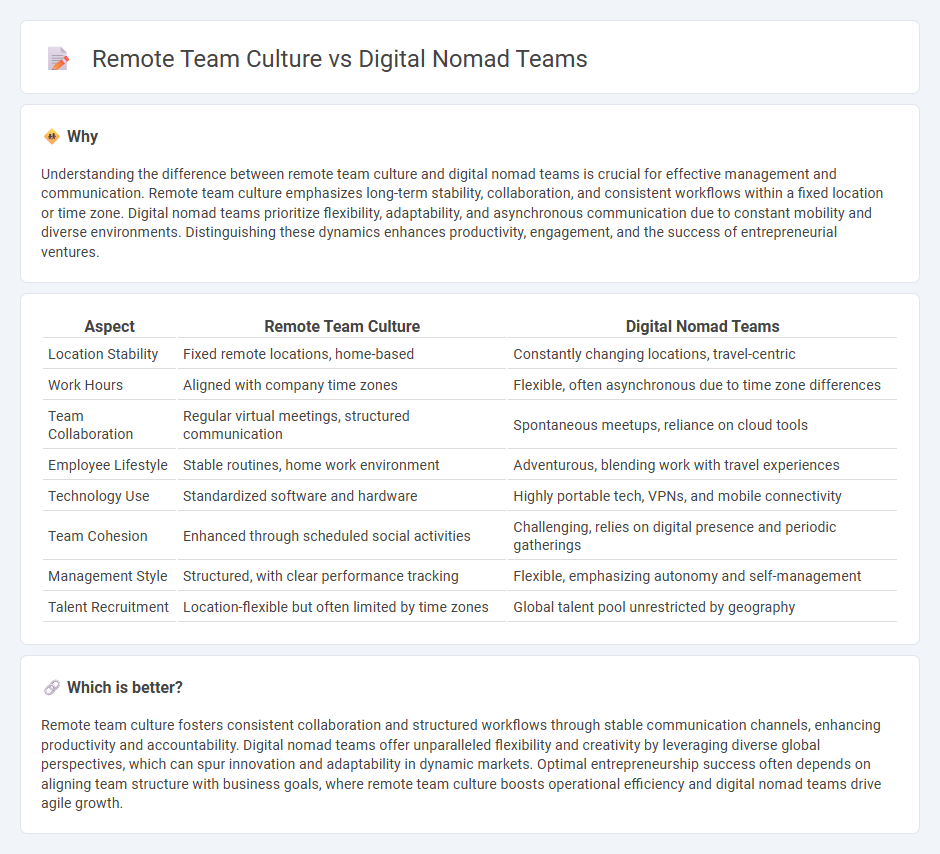
Remote team culture emphasizes structured collaboration, clear communication protocols, and consistent work environments to enhance productivity and team cohesion. Digital nomad teams, by contrast, thrive on flexibility, leveraging global mobility and diverse time zones to drive innovation and adaptability. Explore deeper insights into how these distinct team dynamics can impact entrepreneurial success.
Why it is important
Understanding the difference between remote team culture and digital nomad teams is crucial for effective management and communication. Remote team culture emphasizes long-term stability, collaboration, and consistent workflows within a fixed location or time zone. Digital nomad teams prioritize flexibility, adaptability, and asynchronous communication due to constant mobility and diverse environments. Distinguishing these dynamics enhances productivity, engagement, and the success of entrepreneurial ventures.
Comparison Table
| Aspect | Remote Team Culture | Digital Nomad Teams |
|---|---|---|
| Location Stability | Fixed remote locations, home-based | Constantly changing locations, travel-centric |
| Work Hours | Aligned with company time zones | Flexible, often asynchronous due to time zone differences |
| Team Collaboration | Regular virtual meetings, structured communication | Spontaneous meetups, reliance on cloud tools |
| Employee Lifestyle | Stable routines, home work environment | Adventurous, blending work with travel experiences |
| Technology Use | Standardized software and hardware | Highly portable tech, VPNs, and mobile connectivity |
| Team Cohesion | Enhanced through scheduled social activities | Challenging, relies on digital presence and periodic gatherings |
| Management Style | Structured, with clear performance tracking | Flexible, emphasizing autonomy and self-management |
| Talent Recruitment | Location-flexible but often limited by time zones | Global talent pool unrestricted by geography |
Which is better?
Remote team culture fosters consistent collaboration and structured workflows through stable communication channels, enhancing productivity and accountability. Digital nomad teams offer unparalleled flexibility and creativity by leveraging diverse global perspectives, which can spur innovation and adaptability in dynamic markets. Optimal entrepreneurship success often depends on aligning team structure with business goals, where remote team culture boosts operational efficiency and digital nomad teams drive agile growth.
Connection
Remote team culture thrives on flexibility, trust, and effective communication, which aligns seamlessly with the values embraced by digital nomad teams who operate across diverse geographic locations. Digital nomad teams leverage cloud-based collaboration tools and asynchronous workflows to maintain productivity and cohesion despite time zone differences. The integration of these practices fosters innovation and adaptability essential for entrepreneurial ventures in a globally connected economy.
Key Terms
Asynchronous Communication
Digital nomad teams thrive on asynchronous communication to manage diverse time zones and enhance productivity without real-time dependencies. Remote team culture often integrates synchronous meetings but leans on asynchronous tools like Slack, Trello, and email to maintain clarity and project alignment. Explore how optimized asynchronous communication can transform your team's efficiency and dynamic.
Location Independence
Digital nomad teams thrive on location independence, enabling members to work from diverse global environments while maintaining productivity through flexible schedules and robust digital tools. Remote team culture also emphasizes autonomy but often within a more stable home base, balancing local time zones and structured communication to foster collaboration. Explore how embracing location independence can enhance team dynamics and innovation in your organization.
Collaboration Tools
Digital nomad teams leverage cloud-based collaboration tools like Slack, Trello, and Zoom to maintain real-time communication and manage projects across multiple time zones effectively. Remote team culture increasingly depends on integrated platforms such as Microsoft Teams and Asana to foster engagement, accountability, and seamless workflow despite geographical barriers. Explore how choosing the right collaboration tools can transform productivity and culture in your distributed workforce.
Source and External Links
Remote Teams - Digital Nomad Adventures - Offers team-building adventures designed explicitly for dispersed remote teams, fostering genuine connections and trust through shared experiences in inspiring locations like Thailand and Bali.
Digital Nomads Can Manage Teams, And Manage To See The World - Explains how digital nomads can effectively manage teams remotely while traveling, highlighting the flexibility and creativity required to maintain team collaboration without traditional office routines.
Team - DIGITAL NOMADS Madeira Islands - Describes a community and support network for digital nomads in Madeira Islands, providing coworking spaces, networking opportunities, and resources to help remote workers and their teams thrive while living and working abroad.
 dowidth.com
dowidth.com